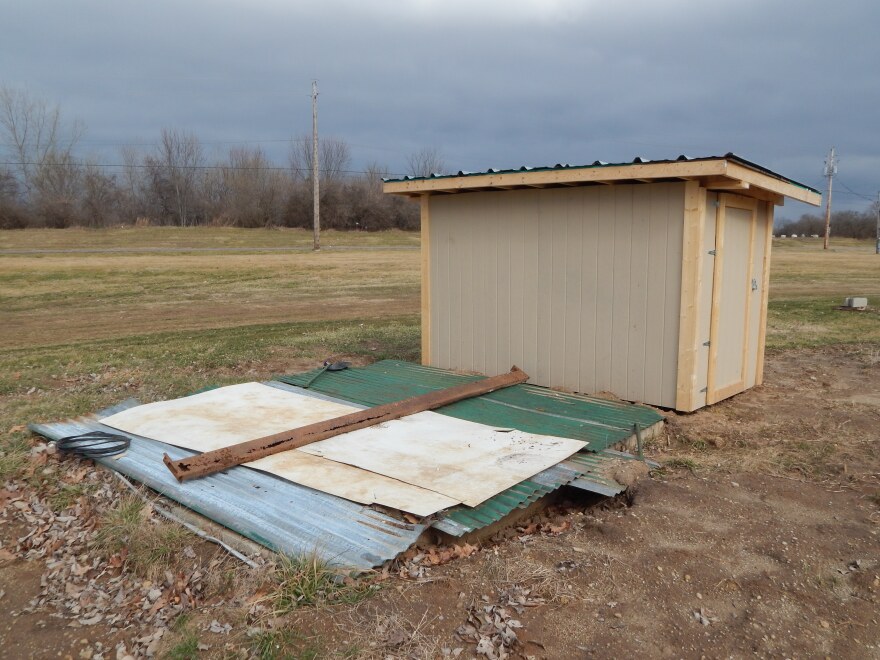Imagine you wake up and go to get in the shower, or brush your teeth, and there’s nothing coming out of the tap. Imagine this happens with no notice, and sometimes goes on for days.
Well, this scenario is real—and we’re not talking about Flint or any city water system. It turns out trailer parks across the country have problems with unreliable water.
In a rural area outside Dayton, a mobile home park called Pineview Estates has had intermittent water service for years. Pineview is just a couple hundred trailers amidst cornfields not far from Interstate 75—a quiet, but convenient place.
Collapsed in her comfy chair at home, a resident named Jeri Reynolds says she’s lived at the park for more than 25 years.
“This was a real nice trailer park back then,” she says, “like something in a magazine.”
These days, it’s routine for her to wake up in the morning to find there’s nothing coming out of the tap.
“You just get up and it’s off,” she says. Residents receive no notice, and never know when the water will come back on. “You know, it’s disgusting. When you can’t take a shower, you can’t flush your toilet. You can’t do nothing. It’s getting bad.”

Reynolds and her neighbors usually don’t even learn why their water is off; sometimes it’s as simple as a broken water main that takes days to fix, and sometimes the water comes out brown, or they get boil alerts taped to the door. Basically it’s an old system that just hasn’t been updated—Ohio Environmental Protection Agency (EPA) documents show years of citations for small problems with the water system including failure to properly treat the water with chlorine.
Jeri Reynolds owns her trailer, but like most trailer park residents she pays rentfor the plot of land it’s on—it’s the landlord who manages the small well water system. Tenantssay they don’t even know how to reach that landlord, Tim Dearwester, and on onsite manager is unwilling to talk or share a contact number. Dearwester also didn’t return messages left with the lawyer for Pineview Estates, and with his father.
This isn’t necessarily an issue of water quality—it’s simply a matter of the landlord’s obligation to keep the water coming out of the tap and keep the system up to date. A quick trip to Google reveals dozens stories about mobile home residents being forced to use bottled water fromLouisiana toCalifornia over just the last couple years.
A researcher named Silvia Gonzalez, a PhD student in urban planning and former assistant director of the Center for the Study of Inequality at UCLA, noticed the trend.
“I was running the data, and I kept seeing that mobile homes kept popping up and popping up as having multiple violations, so I was really intrigued,” she says.
She and colleague Gregory Pierce analyzed census data on mobile homes and water cutoffs,and published a paper last year. They found trailer park residents are more than three times as likely as others to experience at least one water outage a year, even when you control for factors like race and income.

Gonzalez says regulations and responses for these smaller water systems are all over the place—states and counties deal with enforcement differently, and sometimes not at all.
“The way that our water policies are structured…I wouldn’t say they’re structured actually,” she says. “I would say that they’re very fragmented.”
At Pineview Estates, the Ohio EPA has jurisdiction, and has been going back and forth with the owner for years, issuing warnings and demanding fines Dearwester has never paid.
Dina Pierce with Ohio EPA says that after the Attorney General Mike DeWine filed a lawsuit last month (and a judgegranted a restraining order), Dearwester did sign something agreeing to hire a water engineer and fix the problems.
“We are doing everything we can within the regulatory framework to make sure that happens,” Pierce says.
But if it doesn’t happen—if the problems aren’t fixed—the state isn’t left with many choices. The EPA could revoke the water permit, but that could essentially amount to evicting everyone from their own homes. And even after the landlord signed the agreement, the water was off again, with no notice. Everyone woke up to four gallons per trailer of bottled water, left on their porches late at night—providing four gallons of water a day was in the legal agreement. For perspective,the average American uses 80-100 gallons per day.
Jeri Reynolds says most people here are just trying to get out.
“There’s five empty trailers across the street,” she says.
She doesn’t want to leave; she put a lot of money into this trailer, and she has health problems.
“I hope somebody can help us, we need it. We really do.”
The irony is, finding good water in southern Dayton should be easy: Pineview Estates isright next to the Great Miami River and right on top of an abundant underground aquifer.
It’s the water system, the human-made part, that’s the problem.




